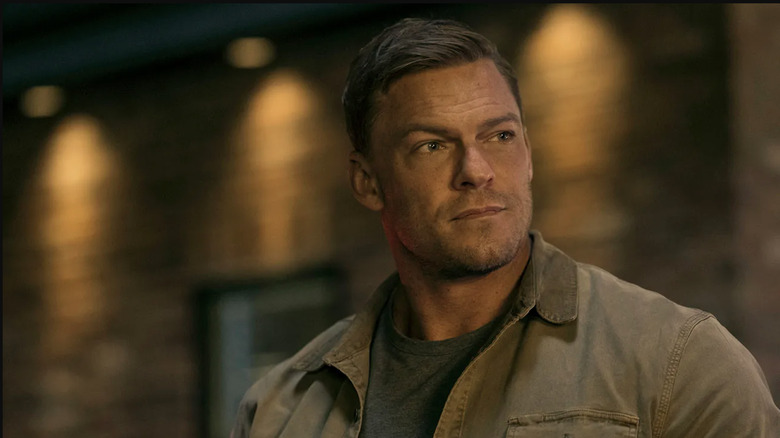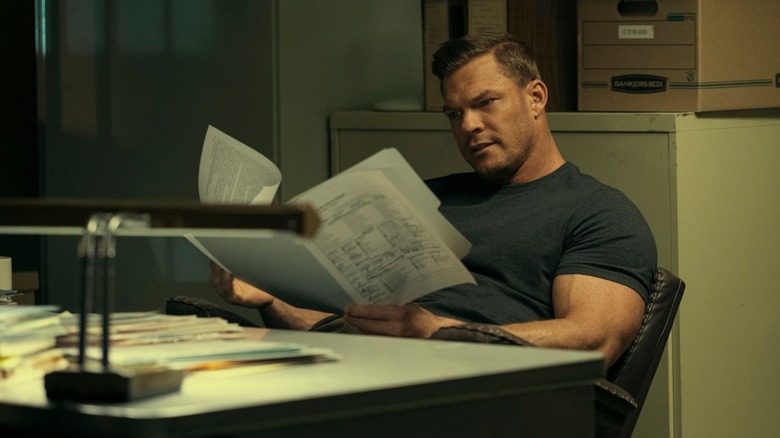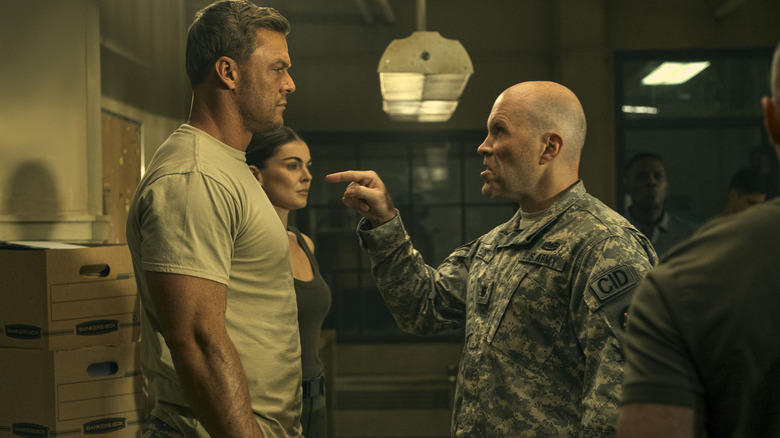Reacher's Hulking Alan Ritchson Is Exactly The Mental Health Advocate We Need Right Now
I'll never forget the day a doctor told me that I had bipolar disorder. Although I was smart and well-versed enough to know, cognitively, that Alex Forrest in "Fatal Attraction" was a problematic example of how a person living with bipolar disorder behaves, I couldn't shake the immediate fear in my soul that this diagnosis meant that I was going to be just like her. Still sexy as hell, obviously, but also the type of person who would stalk a one-night stand, kill their family pet, and pour acid on their car. Fortunately, in the years since my diagnosis, a slew of celebrities have been open about their own diagnoses. Carrie Fisher's memoir "Wishful Drinking" is arguably the highest-profile example, but Mariah Carey, David Harbour, Selena Gomez, Demi Lovato, Linda Hamilton, Jean-Claude Van Damme, and legendary Beach Boys founder Brian Wilson have all spoken candidly about how bipolar disorder impacts their lives.
The Hollywood Reporter recently published a profile about actor Alan Ritchson, and I expected to read about his family, his military brat upbringing, his workout regime, and his thoughts on his explosive popularity following the success of "Reacher." I adored his work on "Blue Mountain State," he was a perfect Gloss in "The Hunger Games: Catching Fire," and I'll be brave enough to admit his Raphael in the Michael Bay-produced "Teenage Mutant Ninja Turtles" movies is one of the redeeming factors. But to be completely transparent, I hadn't done much work digging into the life of Ritchson. I knew I liked him after he was spotted wearing a T-shirt that said "Arrest The Cops Who Killed Breonna Taylor" and the inner Midwest Dad in me is hopelessly addicted to "Reacher," but I've been conditioned to think that all these blond Hollywood hunks are the same.
I've never been more thrilled to be corrected and immediately humbled because Alan Ritchson is exactly the mental health advocate we need right now.
Brains, brawn, and vulnerability
Shortly into the profile, Ritchson tells the interviewer that "mental health is an everyday conversation for me," something that anyone living with mental illness can relate to on a cellular level. But he immediately follows by saying he texts his psychiatrist each day to check in, and on the day of the interview texted her, "I'm great!" Her response was, "Are you really? Too great?" If you're someone with bipolar disorder, this is instantly relatable. Most people have a general understanding of bipolar disorder — the periods of severe depression juxtaposed with periods of overwhelming mania. At my most manic, I certainly feel "good," but it's the type of "good" that makes me feel invincible when in reality I am on the verge of crashing at any second.
The world is accustomed to people who look like me (fat white girl with colored hair aNd PrOnOuNs) talking about mental illness, which makes it a hell of a lot easier for people to ignore whatever I have to say. But when it comes from Alan Ritchson? The guy who plays Jack Reacher? The guy who played a scene where he was stabbed in the forearm and kept punching a dude as if nothing happened? When that guy talks about mental health, people listen, possibly for the first time.
But his diagnosable conditions like bipolar disorder and ADHD (attention-deficit/hyperactivity disorder) aren't the only areas Ritchson is willing to get forthright about. Throughout the interview, he speaks about his past self-destructive habits, his body image insecurities, surviving sexual abuse in the workplace during his time as a model, and his history of suicidal ideation. The rate of male suicide is nearly 4x that of women, and a large part of it is because men aren't given the space or grace to talk about their emotions. Seeing someone like Alan Ritchson — who looks like a drawing of an "alpha male" come to life — talk about these issues could be sincerely life-saving.
A permanent reminder
Ritchson recently added a new tattoo to his forearm, an interpretation of the Greek tragedy and comedy masks, designed and executed by internationally renowned tattoo artist, Pavlo Pozhydaiev, aka Pasha Ink. It's not uncommon for creative types to adorn their bodies with these symbols, but for Ritchson, it represents something so much deeper than acting. As he told the Hollywood Reporter:
"This right here is as close as I'll get to a personal identity. It has a dual meaning for me in the extremes — the happy, the sad, the ups and the downs — as somebody who lives with bipolar and ADHD on a daily basis. Being bipolar has wreaked havoc on my life many, many times. I would wish it away if I could, but it's so much a part of who I am now that I should celebrate it a little or, at least, accept it."
There are those who believe talking about your emotions, your mental health, or your past traumas somehow makes you "weak." And given the stranglehold the patriarchy has on much of the world, there's a hell of a lot of men also suffering from under the rigid societal rules who aren't getting help or talking about their problems out of fear that doing so will change how they are viewed. Well, Jack Reacher is one of the baddest motherf***ers to ever walk the planet, and if the ripped-to-shreds, gargantuan actor who plays him is willing to be honest about the intimate details of his life without anyone denying his strength and power, there's no reason the rest of the world can't try honesty as well.


